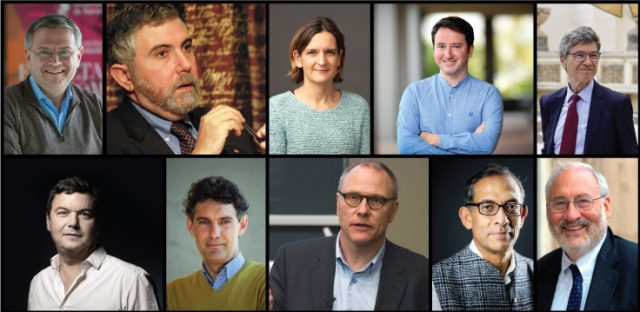There was a time in the early 1900, we were living under the classical gold standard and enjoying perhaps the most significant period of economic development the world had ever seen. However, right after the whole world was bashed due to the Great War and World War II, much of the previous era’s stability came crashing down. Since then, the entire economic system underwent a gradual transition, and many eminent economists played a significant role in ruling the economic game drastically and positively, bringing the global economy to a stable condition. Read on to find out about the top ten of these economists who impacted society.
Please Note: The InCAP offers this list of top 10 influential economists in 2021. It’s an analysis of the International Corporate Association of Professionals (InCAP), so there is no opportunity for debate centering on this ranking.
Born: February 9, 1943 (age 78 years), Gary, Indiana, United States.
Areas of Specialization: Asymmetrical Information, Market.
Contribution: Economics of information, income distribution, risk, corporate governance, public policy, macroeconomics, and globalization.
Award: Nobel Prize, John Bates Clark Medal.
The world’s leading economic educator, Stiglitz, serves on numerous boards, including the Acumen Fund and Resources for the Future. He has played an essential role in creating the Institute for New Economic Thinking (INET), which seeks to reform the discipline to find solutions to the significant challenges of the 21st century. His work explained the circumstances in which markets do not work well and how selective government intervention can upgrade their performance. Back in 2001, he was awarded the Nobel Prize in Economics for analyzing markets with asymmetric information. His most recent book is The Euro: How a Common Currency Threatens the Future of Europe where he analyzes the global financial crisis.
Born: November 5, 1954 (age 67 years), Detroit, Michigan, United States.
Areas of Specialization: Sustainable and Economic Development.
Contribution: International trade and economic growth, the resource curse and extractive industries, public health, economic development, economic geography, strategies of economic reform, international financial markets, the end of poverty.
Award: Blue Planet Prize
A renowned leader in sustainable development, Jeffrey, led a university-wide network of more than 850 research scientists and policy professionals in favor of sustainable development, and he championed the Masters of Development Practice program, which is currently offered at 30 universities across the world., which is now offered at 30 universities worldwide. His efforts to end poverty, overcome macroeconomic instability, promote economic growth, fight hunger and disease and sustainable environmental practices have taken him to more than 125 countries. The End of Poverty: How We Can Make It Happen In Our Lifetime is one of his famous books that promote multidimensional response through the world of work, labor markets, and social and employment protection to eradicate global poverty.
Born: February 21, 1961 (age 60 years), Mumbai, India.
Areas of Specialization: Microcredit, Poverty, Economic Science.
Contribution: Alleviating global poverty, economic development, poor learning, adoption of new technologies, effectiveness of microcredit.
Award: Nobel Prize, Financial Times and McKinsey Business Book of the Year Award.
Banerjee’s experiments with his teammates are in many areas, like education, health and medicine, access to credit, and new technologies, where he had shown poor learning among schoolchildren and concluded a significant cause of poor education in low-income countries. He won the Nobel Prize 2019 for developing an innovative experiment to alleviate global poverty. With his fellow mate, Banerjee introduced mobile clinics to boost child-vaccination rates in India. His work on the effectiveness of microcredit loan programs in promoting economic growth and development inspired multiple organizations. His book, Good Economics for Hard Times: Better Answers to Our Biggest Problems, provides a grounded approach to tackling today’s most pressing global problems, focusing on alleviating inequality and poverty.
Born: 1956 (age 65 years), Guelph, Canada.
Areas of Specialization: Labor Economics.
Contribution: Welfare reform, Immigration, Effects of Medicaid program, Pension incentives and retirement, Labor supply, Education, Minimum wages, Strikes and collective bargaining, Evaluation of social programs, Unemployment, Wage rigidity.
Award: Nobel Prize, John Bates Clark Medal, IZA Prize.
David Card, a labor economist, has won the 2021 Nobel Prize for challenging orthodoxy and dramatically shifted understanding of inequality and the social and economic forces that impact low-wage workers. In work, Card and his colleague used an experiment to refute the conventional notion in labor economics that increases in the minimum wage lead to lower employment rates in low-paying industries. They also investigated the relationships between state investments in public schools and students’ later success in labor markets. Indeed, he is one of the most influential economists.
Born: October 25, 1972 (age 49 years), Paris, France.
Areas of Specialization: Social economics, Development economics.
Contribution: Fight against global poverty, microeconomic issues in third world countries across categories including education, health, public policy, finance and consumption patterns.
Award: Nobel Prize, John Bates Clark Medal, Princess of Asturias Award, Calvó-Armengol International Prize.
Esther seeks to understand the economic lives of the poor, to help design and evaluate social policies. She has worked on health, education, financial inclusion, environment, and governance. Her studies have been skewed towards the microeconomic issues in third world countries across categories such as education, health, public policy, finance, and consumption patterns. She has created and led several organizations focused on helping those in need, including the Abdul Latif Jameel Poverty Action Lab, where she holds directorship. The organization is responsible for assessing programs and schemes targeted towards societal welfare. She was awarded the 2019 Nobel Prize for Economics for helping to develop an innovative experimental approach to alleviating global poverty.
Born: October 30, 1986 (age 35 years), Paris, France.
Areas of Specialization: Public economics.
Contribution: Inequality, wealth, taxation, globalization.
Award: Bernácer Prize.
Gabriel Zucman primarily focuses on the accumulation, distribution, and taxation of global wealth and analyzes the macro-distributional implications of globalization. He has developed prototype distributional national accounts, statistics that decompose macroeconomic growth by social group. He also examines the economic effects of wealth taxation on capital accumulation, international mobility, inequality, tax avoidance, and tax evasion in France, Denmark, and the United States. His studies shed light on current debates about the desirability and practicality of taxing wealth. His most recent book is The Triumph of Injustice: How the Rich Dodge Taxes and How to Make Them Pay.
Born: November 26, 1972 (age 49 years), Spain.
Areas of Specialization: Economics, Public Economics.
Contribution: The measurement of the distributions of income and wealth, optimal tax plans, theory of taxation.
Award: John Bates Clark Medal, MacArthur Fellowship.
Emmanuel Saez has established himself in public economics by making significant contributions. His research tackles policy issues from both a theoretical and an empirical standpoint, refining the theory in ways that link the characteristics of optimal policy to measurable aspects of the economy and behavior on the one hand, and conducting careful and creative empirical studies on the other to fill the measurement gaps identified by the theory. In addition, he has contributed to driving a rebirth of academic interest in taxation by bringing the theory of taxation closer to actual policymaking through a sequence of interrelated publications.
Born: May 7, 1971 (age 50 years), Clichy, France.
Areas of Specialization: Public economics, economic history.
Contribution: Economic inequality, wealth distribution, future capitalism.
Award: CNRS bronze medal, FT and McKinsey ‘Business Book of the Year Award’
Famous economist Piketty, the author of numerous other books and articles in collaboration with other renowned economists, was a compiler of the World Top Incomes Database. In 2014 Piketty gained international celebrity with the English publication of Capital in the Twenty-first Century. The previously little-known author and his nearly 700-page unexpected bestseller also became the subject of a lively debate between liberals and conservatives over economic inequality, wealth distribution, and capitalism’s future. His notable work is Capital au XXIe siècle (Capital in the Twenty-first Century).
Born: February 28, 1953 (age 68 years), Albany, New York, United States.
Areas of Specialization: International trade, economic geography, macroeconomics.
Contribution: International trade theory; New trade theory; New economic geography.
Award: Nobel Prize, John Bates Clark Medal, Princess of Asturias Award, H. C. Recktenwald Prize.
As a theorist in international trade, economic geography, and macroeconomics, Krugman has been one of his generation’s best expositors of economics. His excellent book Pop Internationalism and popular articles brought a strong case for free trade. In presenting his trade model, Krugman planted the seeds for his later work in economic geography, where he explained the location of economic activity. One of Krugman’s key contributions is his 1998 paper on Japan’s liquidity trap in macroeconomics. In that paper, Japan’s interest rates were so low that its economy was in a liquidity trap in which money and bonds were “essentially perfect substitutes” was well examined. He won the Nobel Prize for contributing New Trade Theory and New Economic Geography.
Born: February 20, 1961 (age 60 years), Moscow, Russia.
Areas of Specialization: Behavioral finance; Law and economics; Development economics
Contribution: Legal origins theory; Big push model.
Award: John Bates Clark Meda
Shleifer makes history in scholarly publishing and applied investing and consultancy. His study argues conceptions of rational and efficient financial markets and highlights the importance of legal institutions in the evolution of financial markets. His contributions to financial economics and development economics are particularly well-known. Shleifer’s research focuses on behavioral finance, which investigates how cognitive bias and other behavioral variables affect the financial market structure, performance, and investment returns. He is an opponent of the efficient markets theory, claiming that the evidence contradicts the assumptions of rationality and short arbitrage in financial markets. Instead, he teaches and writes in real-world financial markets that investors and traders are constrained by risk aversion, short time horizons, and agency issues.
















